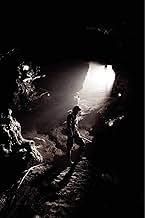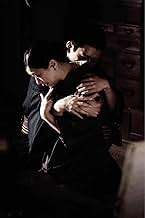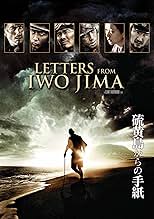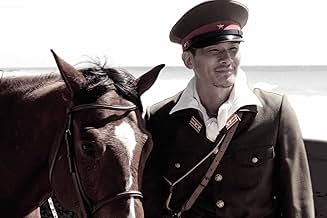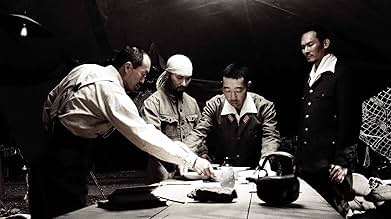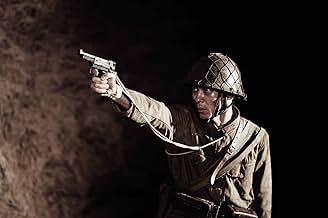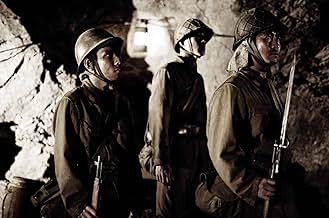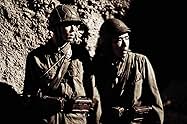La storia della battaglia di Iwo Jima tra gli Stati Uniti e il Giappone imperiale durante la seconda guerra mondiale, raccontata dalla prospettiva dei giapponesi che la combatterono.La storia della battaglia di Iwo Jima tra gli Stati Uniti e il Giappone imperiale durante la seconda guerra mondiale, raccontata dalla prospettiva dei giapponesi che la combatterono.La storia della battaglia di Iwo Jima tra gli Stati Uniti e il Giappone imperiale durante la seconda guerra mondiale, raccontata dalla prospettiva dei giapponesi che la combatterono.
- Regia
- Sceneggiatura
- Star
- Vincitore di 1 Oscar
- 25 vittorie e 39 candidature totali
Shidô Nakamura
- Lieutenant Itô
- (as Shidou Nakamura)
Luke Eberl
- Sam
- (as Lucas Elliot)
Sonny Saito
- Medic Endô
- (as Sonny Seiichi Saito)
Recensioni in evidenza
Don't listen to the people who call this movie inaccurate or revisionist history.
The movie is accurate. There were people on both sides of the war who at times showed kindness.
Labeling all the Japanese soldiers as people who tortured POWS would be like saying all American soldiers in Vietnam killed and rape innocent Vietnamese. Or all American soldiers in Cuba tortured POWS from the wars in the Middle East. You can't group people together like that.
This movie shows better than any other film that there's really no good guys or bad guys when it comes to war. War is just pointless.
The movie is not supposed to be a documentary so the people who bash it for little details should go rent a documentary if thats what they want to see.
Also, Clint Eastwood deserves major credit for telling both sides of the war. Too many war movies always show the enemy as "heartless monsters" when it reality its never like that.
This is without a doubt the best movie of the year. Make sure you go see it.
The movie is accurate. There were people on both sides of the war who at times showed kindness.
Labeling all the Japanese soldiers as people who tortured POWS would be like saying all American soldiers in Vietnam killed and rape innocent Vietnamese. Or all American soldiers in Cuba tortured POWS from the wars in the Middle East. You can't group people together like that.
This movie shows better than any other film that there's really no good guys or bad guys when it comes to war. War is just pointless.
The movie is not supposed to be a documentary so the people who bash it for little details should go rent a documentary if thats what they want to see.
Also, Clint Eastwood deserves major credit for telling both sides of the war. Too many war movies always show the enemy as "heartless monsters" when it reality its never like that.
This is without a doubt the best movie of the year. Make sure you go see it.
10sford-20
I was very disappointed to learn that this movie was only going to have a limited showing in the US, only one or two theaters on either coast. My wife and I both enjoyed "Flags" and were pleased when we learned that Clint Eastwood made a second movie, this time telling the story from the Japanese perspective. As luck would have it, we going to Japan for the holidays so we decided to try and see the movie in Tokyo during our trip. We went to the Ginza area of Tokyo and, to our surprise, the movie was completely sold out. We needed to buy tickets at least one day in advance. Further, we learned that the movie was currently number 1 in Japan. Wow that's impressive that an American made movie would become number one in Japan! Way to go, Clint! After a little extra planning and some adjustments to our schedule, we bought advance tickets and came back the next day.
We completely loved it. We were moved and stirred with many emotions including anger, anger over the horrors of war. We actually liked it better than "Flags of our Fathers". The movie was in Japanese and, as near as we could tell, Japanese appears to be the native language of the film. There were brief moments of English, American solders talking, one flash back scene before the war during a foreign dignitary dinner, and of course the credits at the end. The movie would have to be translated and/or sub titled to English in order to have half a chance in the US. Frankly, I think translation would take away from the movie's beauty and meaning. I understand a limited amount of Japanese so I could follow most of the story. The theater was very big and packed. I was a little uncomfortable at first; I may well have been the only American in the place. My wife (who is Japanese) and I sat next to an older couple. At several points during the film, I thought I noticed the man from the couple crying. When the film ended, my wife talked with the couple and learned that the old man's father died in Iwo jima. Later during the trip, speaking with Japanese friends and seeing the Japanese news, stories of lost loved ones from the war were common and this movie for the Japanese people has brought many of these memories out in the open.
To the Japanese, Iwo jima was a part of their homeland where a foreign invader was going to land and begin its invasion on Japanese soil. Throughout all of recorded Japanese history, never had a foreign invader prevailed in war against the Japanese on Japanese land. The imperial Japanese government of that time used this when they sent fighters to Iwo jima. These fighters were to ordered to "fight to the death" defending their country. That to loose and not die fighting would bring disgrace to self and family. They knew that America was planning to send an overwhelming force and they knew that they were being sent to die. For Americans, Iwo jima was just another far away place and different point in time where American boys were sent and where, unfortunately, some lives were lost fighting for freedom. My god, have we become that blasé about the wars our sons and daughters are being sent to fight in? My wife and I are unique, not typical American movie goers. I'm American, my wife is Japanese. Together, we've visited and cried together at the A-bomb Dome in Hiroshima, and again at the Arizona Memorial in Hawaii. I have relatives who fought in the Pacific, she also has family who fought in the war and who lived in Hroshima. I have two sons now serving in the US Marines. Together my wife and I watched and enjoyed both movies. The movies really didn't bring anything new, historically, to us about Iwo jima. But, the movies did do an excellent job reminding us that the ones who pay the price for war are normal everyday people. People who really don't understand the reasons or the politics behind why they are being sent to die. People who live, love, and are loved by family and friends. People with dreams and ambitions. But, for some reason when called by the leaders of the time, they go forward, obey orders, and do their duty. Sometimes, paying the ultimate price.
I've grown up with Clint Eastwood and it has been a wonderful entertaining journey. These two movies are, in my opinion, his best. Not because of the action, or the drama, or any of the other things that Clint Eastwood is known for, but because he's given us two interlinked stories about the affects of war on the people who are called to pay the ultimate price people like you and me. We may be from different cultures, eat different food, speak different languages, prey to God differently, but we all have things in common. We all live, love, want to be loved, and we dream about and long for peace. And, sometimes we are called to serve and pay for the opportunity. Thank you Clint.
We completely loved it. We were moved and stirred with many emotions including anger, anger over the horrors of war. We actually liked it better than "Flags of our Fathers". The movie was in Japanese and, as near as we could tell, Japanese appears to be the native language of the film. There were brief moments of English, American solders talking, one flash back scene before the war during a foreign dignitary dinner, and of course the credits at the end. The movie would have to be translated and/or sub titled to English in order to have half a chance in the US. Frankly, I think translation would take away from the movie's beauty and meaning. I understand a limited amount of Japanese so I could follow most of the story. The theater was very big and packed. I was a little uncomfortable at first; I may well have been the only American in the place. My wife (who is Japanese) and I sat next to an older couple. At several points during the film, I thought I noticed the man from the couple crying. When the film ended, my wife talked with the couple and learned that the old man's father died in Iwo jima. Later during the trip, speaking with Japanese friends and seeing the Japanese news, stories of lost loved ones from the war were common and this movie for the Japanese people has brought many of these memories out in the open.
To the Japanese, Iwo jima was a part of their homeland where a foreign invader was going to land and begin its invasion on Japanese soil. Throughout all of recorded Japanese history, never had a foreign invader prevailed in war against the Japanese on Japanese land. The imperial Japanese government of that time used this when they sent fighters to Iwo jima. These fighters were to ordered to "fight to the death" defending their country. That to loose and not die fighting would bring disgrace to self and family. They knew that America was planning to send an overwhelming force and they knew that they were being sent to die. For Americans, Iwo jima was just another far away place and different point in time where American boys were sent and where, unfortunately, some lives were lost fighting for freedom. My god, have we become that blasé about the wars our sons and daughters are being sent to fight in? My wife and I are unique, not typical American movie goers. I'm American, my wife is Japanese. Together, we've visited and cried together at the A-bomb Dome in Hiroshima, and again at the Arizona Memorial in Hawaii. I have relatives who fought in the Pacific, she also has family who fought in the war and who lived in Hroshima. I have two sons now serving in the US Marines. Together my wife and I watched and enjoyed both movies. The movies really didn't bring anything new, historically, to us about Iwo jima. But, the movies did do an excellent job reminding us that the ones who pay the price for war are normal everyday people. People who really don't understand the reasons or the politics behind why they are being sent to die. People who live, love, and are loved by family and friends. People with dreams and ambitions. But, for some reason when called by the leaders of the time, they go forward, obey orders, and do their duty. Sometimes, paying the ultimate price.
I've grown up with Clint Eastwood and it has been a wonderful entertaining journey. These two movies are, in my opinion, his best. Not because of the action, or the drama, or any of the other things that Clint Eastwood is known for, but because he's given us two interlinked stories about the affects of war on the people who are called to pay the ultimate price people like you and me. We may be from different cultures, eat different food, speak different languages, prey to God differently, but we all have things in common. We all live, love, want to be loved, and we dream about and long for peace. And, sometimes we are called to serve and pay for the opportunity. Thank you Clint.
At the conclusion of the film a person behind me said, "Incredible," twice. Another person followed with, "A masterpiece." I would concur. Perhaps it isn't a perfect film but it is a movie with great impact. I find that it is a testament to the skill of Clint Eastwood as a director and Iris Yamashita as screenwriter that some of the scenes that had the greatest impact were of minor thingsa letter read out loud, the way someone saluted, a tear, a song...
There were no clear cut heroes or villains beyond "war" itself. I'm reminded of that saying, "No one wins a war. One side simply loses more than the other." War diminishes us all. We must learn to turn our backs on such endeavors even if it means that the military/industrial death merchants take a cut in profits or that they truly learn to hammer swords into plow shares.
If the film were to depict the battle in a manner that was realistically experienced by the soldiers the film would be unbearable to any viewer. One must see the battle and history as a kind of allegorical backdrop to a story about the utter inhumanity and futility of war. As a film it had to illustrate the overall societal insanity of war through a human lens, and it did this in a deeply moving way.
There were no clear cut heroes or villains beyond "war" itself. I'm reminded of that saying, "No one wins a war. One side simply loses more than the other." War diminishes us all. We must learn to turn our backs on such endeavors even if it means that the military/industrial death merchants take a cut in profits or that they truly learn to hammer swords into plow shares.
If the film were to depict the battle in a manner that was realistically experienced by the soldiers the film would be unbearable to any viewer. One must see the battle and history as a kind of allegorical backdrop to a story about the utter inhumanity and futility of war. As a film it had to illustrate the overall societal insanity of war through a human lens, and it did this in a deeply moving way.
I was not one of those who was really taken with "Flags Of Our Fathers." I thought the story was rather lacklustre and lacking to be honest, and so had little interest in "Letters From Iwo Jima." This is the sort of sequel to "Flags" - or it might be better called a companion to "Flags." Both were directed by Clint Eastwood and "Letters" shows the story of the Battle of Iwo Jima from the Japanese perspective - and much to my surprise I liked this movie very much. It was, I thought, by far superior to "Flags."
Most American movies dealing with World War II in the Pacific do so from a specifically American perspective that portrays the Japanese in an unflattering light. That's understandable. In the context of World War II, after all, Japan was the enemy. But "Letters" takes a very personal and human look at the Japanese soldiers assigned to Iwo Jima's defence. To me, the point that was being made was how much alike the Japanese and the Americans were. Both were fighting for their countries; both had little knowledge of the other, and therefore had distorted views of the other; both were doing their duties as they understood it. And, of course, the movie is based on letters supposedly written by Japanese soldiers on Iwo Jima - addressed to wives and mothers and other family. This is a surprisingly sympathetic look at the Japanese, something I really wasn't expecting from Clint Eastwood.
The story focuses on Japanese General Tadamichi Kuribayashi, who commanded the Japanese defence of Iwo Jima. Kuribayashi was a man well acquainted with the United States, having lived there for two years on a military exchange, and he had no illusions about Japan's ability to win the war, largely seeing Iwo Jima as a suicide mission from which he wouldn't return. He's portrayed very well here by veteran Japanese actor Ken Watanabe. The movie is almost entirely in Japanese (except for some brief scenes that feature American soldiers) with subtitles, but - although I'm usually not big on subtitles - this didn't really distract me. They were appropriate to this movie and provided a sense of authenticity.
This isn't a "war movie" in the normal sense of the war. Although there are battle scenes (and some of it is mildly graphic) it is for the most part the personal stories of the Japanese soldiers that dominate. It's extremely well done, and deserves a lot of credit for showing a side of the Japanese soldier in World War II that's rarely shown. (8/10)
Most American movies dealing with World War II in the Pacific do so from a specifically American perspective that portrays the Japanese in an unflattering light. That's understandable. In the context of World War II, after all, Japan was the enemy. But "Letters" takes a very personal and human look at the Japanese soldiers assigned to Iwo Jima's defence. To me, the point that was being made was how much alike the Japanese and the Americans were. Both were fighting for their countries; both had little knowledge of the other, and therefore had distorted views of the other; both were doing their duties as they understood it. And, of course, the movie is based on letters supposedly written by Japanese soldiers on Iwo Jima - addressed to wives and mothers and other family. This is a surprisingly sympathetic look at the Japanese, something I really wasn't expecting from Clint Eastwood.
The story focuses on Japanese General Tadamichi Kuribayashi, who commanded the Japanese defence of Iwo Jima. Kuribayashi was a man well acquainted with the United States, having lived there for two years on a military exchange, and he had no illusions about Japan's ability to win the war, largely seeing Iwo Jima as a suicide mission from which he wouldn't return. He's portrayed very well here by veteran Japanese actor Ken Watanabe. The movie is almost entirely in Japanese (except for some brief scenes that feature American soldiers) with subtitles, but - although I'm usually not big on subtitles - this didn't really distract me. They were appropriate to this movie and provided a sense of authenticity.
This isn't a "war movie" in the normal sense of the war. Although there are battle scenes (and some of it is mildly graphic) it is for the most part the personal stories of the Japanese soldiers that dominate. It's extremely well done, and deserves a lot of credit for showing a side of the Japanese soldier in World War II that's rarely shown. (8/10)
The companion film to "Flags of Our Fathers" shows the battle of Iwo Jima from the Japanese point of view. Starting with the building of fortifications, hiding from relentless bombardment, and fending off an equally strong attack as American troops land on the island.
"Letters from Iwo Jima" just like "Flags of Our Fathers" is a first rate war movie with a relevant message with its critical nature. "Flags" showed the selling of war and "Letters" does the same, albeit with a different mind-set. Japan was an empire governed by a monarch back then so the military mentality was quite different, but it is also important to note the similarities. Especially at the base of the social pyramid where it is quite apparent that people are people no matter where you go.
Virtually all of the uber-patriotic tendencies that were rampant in Imperial Japan during WWII were also in Nazi Germany and, as both "Flags" and "Letters" demonstrate in the United States as well. People were used for the purpose of the government and were fed propaganda just the same. Maybe a different in a different form, but in the end it is all the same.
Ken Wantanbe is the film's highlight as a military man torn between his sense of duty and his inner feelings. As commander of the island he sees amongst his men the fanaticism, the pacifism, the "just do our job" crowd, and many other configurations of thought in between and mixed with the others. Even strange that some men initially want to fight and are proud to serve in the military and what's shocking is that some of their wives and mothers believe the same.
That paints a landscape of war as something amidst all of the stereotypes that have been made of it. Since that is where the truth usually lies, amidst all the gray matter. --- 9/10
Rated R: war violence/carnage
"Letters from Iwo Jima" just like "Flags of Our Fathers" is a first rate war movie with a relevant message with its critical nature. "Flags" showed the selling of war and "Letters" does the same, albeit with a different mind-set. Japan was an empire governed by a monarch back then so the military mentality was quite different, but it is also important to note the similarities. Especially at the base of the social pyramid where it is quite apparent that people are people no matter where you go.
Virtually all of the uber-patriotic tendencies that were rampant in Imperial Japan during WWII were also in Nazi Germany and, as both "Flags" and "Letters" demonstrate in the United States as well. People were used for the purpose of the government and were fed propaganda just the same. Maybe a different in a different form, but in the end it is all the same.
Ken Wantanbe is the film's highlight as a military man torn between his sense of duty and his inner feelings. As commander of the island he sees amongst his men the fanaticism, the pacifism, the "just do our job" crowd, and many other configurations of thought in between and mixed with the others. Even strange that some men initially want to fight and are proud to serve in the military and what's shocking is that some of their wives and mothers believe the same.
That paints a landscape of war as something amidst all of the stereotypes that have been made of it. Since that is where the truth usually lies, amidst all the gray matter. --- 9/10
Rated R: war violence/carnage
Lo sapevi?
- QuizShot back-to-back with Flags of Our Fathers (2006).
- BlooperWhen the soldiers in the cave commit suicide they use what look like type 97 hand fragmentation grenades held close to their chests.
The point of most grenades is to send out numerous fragments as fast-flying projectiles killing those close by (a few yards) or seriously injuring those further away.
However, even though the soldiers are all standing a few feet apart, as each grenade explodes only the person holding it is affected.
- Citazioni
General Tadamichi Kuribayashi: If our children can live safely for one more day it would be worth the one more day that we defend this island.
- Colonne sonoreString Quartet No.6, Op. 1-6, Hob. III-6, Mov.2
Composed by Joseph Haydn
At a party where Ken Watanabe participated
I più visti
Accedi per valutare e creare un elenco di titoli salvati per ottenere consigli personalizzati
Dettagli
- Data di uscita
- Paese di origine
- Siti ufficiali
- Lingue
- Celebre anche come
- Cartas desde Iwo Jima
- Luoghi delle riprese
- Aziende produttrici
- Vedi altri crediti dell’azienda su IMDbPro
Botteghino
- Budget
- 19.000.000 USD (previsto)
- Lordo Stati Uniti e Canada
- 13.756.082 USD
- Fine settimana di apertura Stati Uniti e Canada
- 89.097 USD
- 24 dic 2006
- Lordo in tutto il mondo
- 68.673.228 USD
- Tempo di esecuzione2 ore 21 minuti
- Colore
- Mix di suoni
- Proporzioni
- 2.39 : 1
Contribuisci a questa pagina
Suggerisci una modifica o aggiungi i contenuti mancanti







